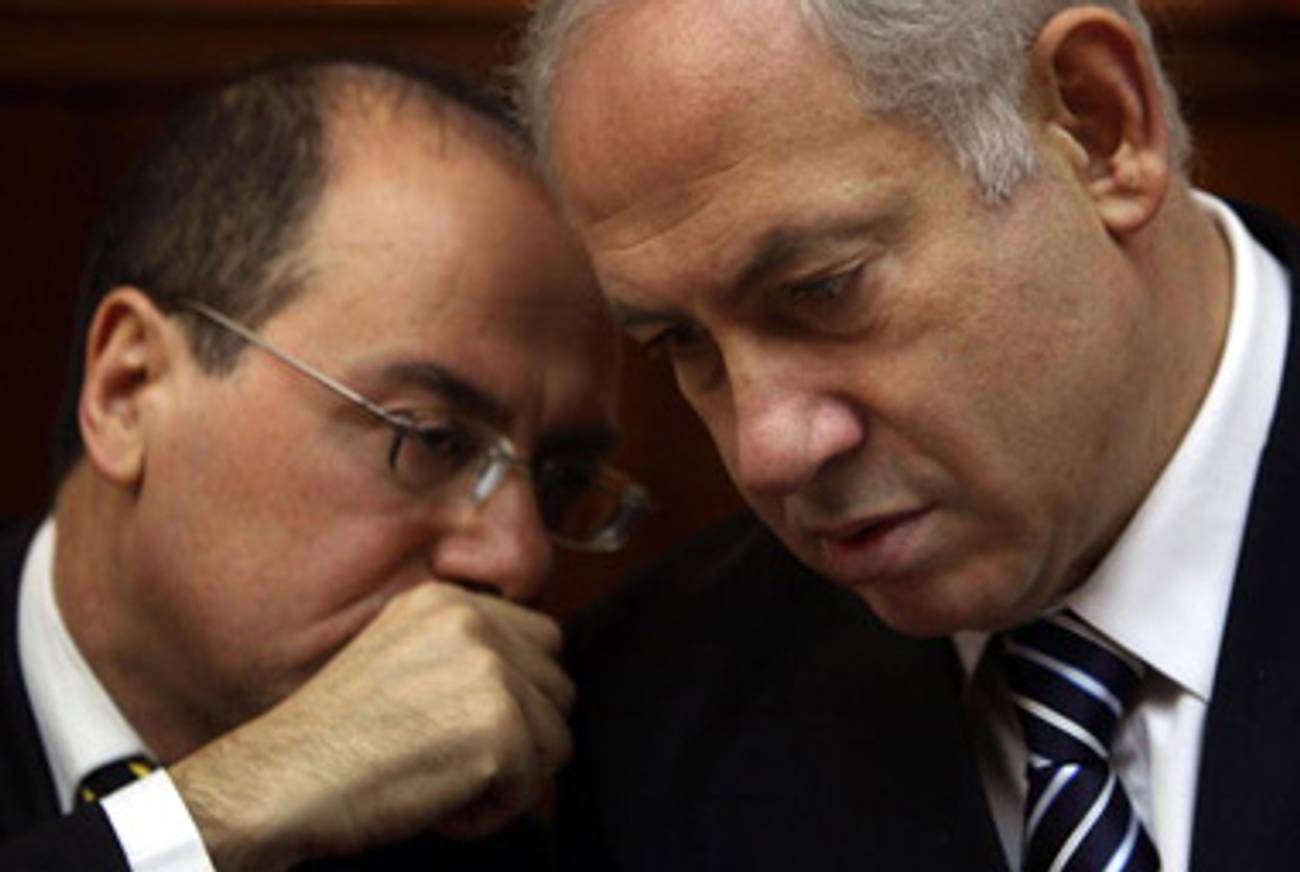Tablet Magazine Talks to Vice PM Shalom
How Turkey looks from Israel




Last week, Israeli Prime Minister Benjamin Netanyahu canceled a trip to Washington, D.C., amid the aftermath of the Free Gaza flotilla raid. But other members of the Israeli cabinet, including Foreign Minister Avigdor Lieberman, have been in the United States this week. Over the weekend, Tablet Magazine met with Silvan Shalom—a sometime Likud Party rival to Netanyahu who is currently Israel’s vice prime minister and minister for regional development, as well as its former foreign minister—to talk about the flotilla, and about Israel’s relations with American Jews.
Do you think Turkey’s prime minister, Recep Tayyip Erdogan, intentionally deceived Israel about the nature of the Free Gaza flotilla, as part of a regional power play?
Unfortunately, the Turks, in some way it looks like they’re trying to revive the Ottoman Empire that ruled the Middle East for 500 years until 1917. Before the English arrived they were ruling the whole territory. So unfortunately it doesn’t go in the right direction, but I don’t think we have to give up. Maybe there is still an option to make it better with the Turks, but it takes two to tango as you know.
I met the president Abdullah Gul, who was my colleague as foreign minister, many, many times, and we are still sharing good relations, personal relations.
Have you talked to him this week?
No, I didn’t. I let the Foreign Ministry and the prime minister [Netanyahu] and his minister of defense [Ehud Barak] deal with that but it might be that if I would be asked, I would do it. Because he is, I think, a good guy, and he was very positive during our meetings. Turkey was the first Muslim country to recognize the State of Israel after the resolution that was taken in the UN, and since then we are having strategic relations, economically and militarily. So it’s very important for both countries.
I can’t tell you that they see that. There is a debate now within Turkey about the future of Turkey. They are facing an election in the near future and only after that will we be able to understand which direction Turkey’s moving.
Do you think the Obama administration was caught off-guard by Turkey’s actions on the flotilla?
I really don’t know. You have to ask them. What we know is that Turkey was close to the United States, as well as to Israel, for many, many years. And unfortunately it doesn’t look the same these days. I believe, personally, that it is still not a loss. I still would like to believe that there is still, let’s say, a glimmer of hope. But if not, we’ll have to face the new reality and get prepared for the future.
Do you think Turkey is trying to ally with Tehran, or trying to one-up them?
It looks a little bit funny, because Tehran is trying to revive the Persian empire, and they are trying, maybe—what I have said about Turkey, it is mentioned in the book of the foreign minister of Turkey that it is the time to revive the Ottoman Empire. Maybe he didn’t say it that way, but the meaning is that they have to be more involved in the region.
We are looking on the relations with Turkey as relations that are strategically very important for both sides, and we would like to believe that they will be as good as they have been before. But to help the Hamas these days means to stab Abu Mazen and his colleagues in their back. Because for the Palestinian Authority, to help the Hamas it means to really endanger their safety and their needs in the region.
Do you think the Turks are trying to establish a direct allegiance with Hamas?
I really don’t know. But the fact is that when you help the Hamas you weaken the Palestinian Authority. While we have a political debate or conflict with the Palestinian Authority, with Hamas it is a religious one, because they are saying in their covenant, in their charter, very clearly that first Israel has no right to exist and they should destroy the state of Israel. They say the territory of Israel does not belong to the Palestinians, nor to the Arabs, it belongs to every Muslim around the world, and that is why there is no Muslim, whether he is a king or a president or a prime minister, who has a right to give up an inch of the territory. And there is no way to deal with them because for them we are not allowed to stay there. And we have to go back, like Helen from the White House said, to go to Poland and Germany and other countries that we came from.
Could Netanyahu have done more over the past few months to knit things together with Washington?
It always takes two to tango. And of course for us the United States is the best ally. It might be the only ally in the world. Our partnership is based on common values, human rights, the rule of law, democracy, the same culture. And of course strategically I have told the Americans more than once that while all the others have the option to move in one day from the United States to the others, for Israel there is no option. You can rely only on Israel as your ally in the Middle East. So it’s very good that you develop good relations with the others but one day they can be here and the next they can be there. And we know from the past, they were very hostile some of them to the United States for years. And after the collapse of the Soviet Union some of them maybe felt more free to become good friends of the United States. The Middle East is very important strategically and economically and I think it’s very important for both of us to keep good relations with each other. And the support for Israel is based on bipartisan support. And I would like to admit that the dispute that we have about the settlements is with both administrations. I met President Obama, I met Hillary Clinton, many times, and their record during their tenure as senators was 100 percent in favor of Israel. So it might be that they don’t see eye to eye with Israel, it might be that it takes time because engagement is not working, but still.
What about the question of whether Israel will become a strategic liability to the US, which was recently mooted by Anthony Cordesman and raised in the New York Times? Does Israel have a responsibility to make sure it’s an asset to the US?
Some believe that Israel is a burden. But there are those like Helen [Thomas], who don’t back Israel no matter Israel does. But the majority of the American people, the majority of the American politicians, and I think all administrations were always in favor of Israel because they believe the only real ally that the United States has in the Middle East is Israel. And I would like to believe that it will continue.
Peter Beinart’s recent article has prompted a lot of critical discussion among American Jews about Israel. Do you feel Israel needs to figure out how to speak to American Jews more clearly, or that people like Beinart are mistaken about Israel and Zionism?
I would be more happy to find out that some Palestinians or Muslims were trying to criticize the Palestinian government, the Hamas or even the Palestinian Authority, about what they are doing. I never found those, and we have been waiting now for decades to find some Arabs or some Muslims or some Palestinians who would criticize them and say that Israel is right, that you can justify what Israel is doing for self-defense because they are under a huge threat that is imposed by so many countries. And it’s maybe the only country in the world that still doesn’t have final borders, and where there are still countries in the UN trying to wipe it off the map. I never found them, but you always find Jews that I’m sure have very good intentions [criticizing Israel. But they are coming with their approach that I think is not really helping to empower or to strengthen the State of Israel, even if their intentions are good. They are coming from a very good place. But we find unfortunately that in our region that if you are weak you can get lost. If you are strong, you can survive.
So what do you say to them? Does Israel have a response?
What I say to them is, we would like of course to have the support of the whole American Jewry, no matter what government is in power. The Israeli people of course have the right to elect the chosen government that it would like to see in power–but while Israel is facing so many troubles and problems, and so many countries that are opposing Israel, and even the idea that Israel has the right to exist, and some who want to send us back to Germany and Poland and North Africa, and unfortunately it is not only Ahmadinejad recently—[we hope] that they would stand with us. But of course I am not, let’s say, not realistic. I am realistic, and I know it would never happen.
Is it the government’s responsibility to reach out to American Jews who are critical of Israeli policies?
I am in favor of talking to everyone. I am not in favor to ban someone, or to boycott them. But still, I think they are wrong. I met many of them, not members of J Street but those with the same liberal opinions and I tried many times to explain what it means and how Arabs look at that. But of course they have the right to their own opinions. I cannot disagree with their rights as human beings to have their own opinions.
Is there another election on the horizon?
Who knows? In Israel we always have to get prepared for another election.
Allison Hoffman is a senior editor at Tablet Magazine. Her Twitter feed is @allisont_dc.